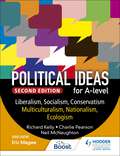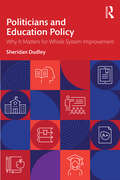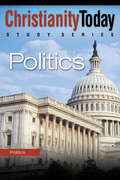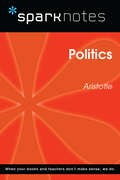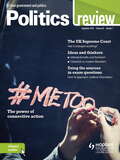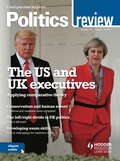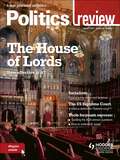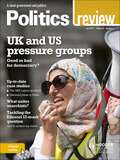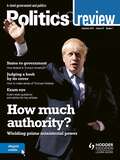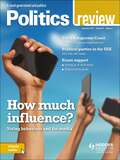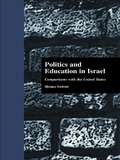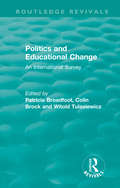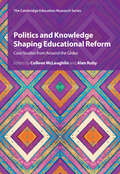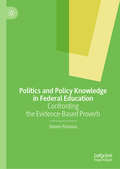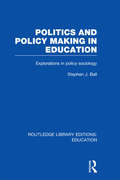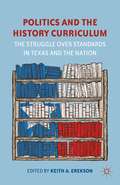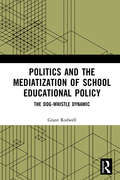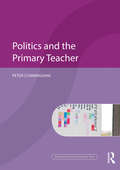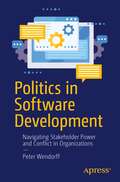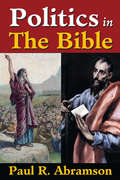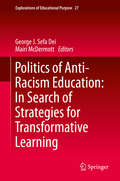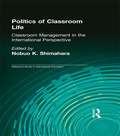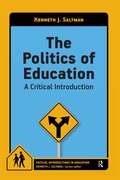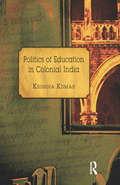- Table View
- List View
Political ideas for A Level: Liberalism, Socialism, Conservatism, Multiculturalism, Nationalism, Ecologism 2nd Edition
by Charles Pearson Richard Kelly Neil McNaughtonThese Student's Books will help students understand the core ideas and principles behind the political ideologies, and how they apply in practice to human nature, the state, society and the economy.- Comprehensive coverage of the ideologies of Liberalism, Socialism, Conservatism, Multiculturalism, Nationalism and Ecologism- Definitions of key terms and concepts to help clarify knowledge and understanding of political language.- Exam focus sections at the end of each chapter to test and develop understanding of key topics, offering practice for short and long essay questions
Political ideas for A Level: Liberalism, Socialism, Conservatism, Multiculturalism, Nationalism, Ecologism 2nd Edition
by Charles Pearson Richard Kelly Neil McNaughtonThese Student's Books will help students understand the core ideas and principles behind the political ideologies, and how they apply in practice to human nature, the state, society and the economy.- Comprehensive coverage of the ideologies of Liberalism, Socialism, Conservatism, Multiculturalism, Nationalism and Ecologism- Definitions of key terms and concepts to help clarify knowledge and understanding of political language.- Exam focus sections at the end of each chapter to test and develop understanding of key topics, offering practice for short and long essay questions
Politicians and Education Policy: Why It Matters for Whole System Improvement
by Sheridan DudleyBased on an in-depth case study, this book reveals how politicians, as policy makers, conceptualise, develop and initiate large-scale education system reform and why it matters for whole system school improvement.Governments all over the world are spending increasing time, money and effort on improving school systems but the evidence suggests that few of them are getting it right. There is much research devoted to educational strategies, policies, reform initiatives and outcomes. However, what is often missing is a generally agreed set of policies or principles which Ministers can draw on as a guiding framework. This book shows how political context impacts the development of education policy and reveals the critical and dynamic relationship between politics, policy and process. This book gives new insights into politicians as leaders in large-scale education system reform, distils lessons and identifies three practical strategic frameworks which provide new ways of understanding and engaging in whole system reform.Offering unique “insider” insights from an Education Minister, their staff, public servants and key stakeholders, this book is written for all politicians, policy makers and educators involved in school improvement, as well as students of educational leadership and policy.
Politics (Christianity Today Study Series)
by ZondervanThe Christian Today Study Series delves into today's vital cultural issues to get to the heart of what these topics mean to you.Each 8-week study is based on articles written by some of today's leading Christian authors and published by the Christianity Today magazines. These remarkable studies will foster deep, authentic, and relevant discussion that will challenge and grow any small group.Politics & Government will take on a variety of topics, such as: Christians and Political InvolvementIs America a Judeo-Christian Country?Separation of Church & StateRelying on Government or God?Based on articles by a variety of authors, such as:Andy CrouchLeith AndersonTony Campolo
Politics (SparkNotes Philosophy Guide)
by SparkNotesPolitics (SparkNotes Philosophy Guide) Making the reading experience fun! SparkNotes Philosophy Guides are one-stop guides to the great works of philosophy–masterpieces that stand at the foundations of Western thought. Inside each Philosophy Guide you&’ll find insightful overviews of great philosophical works of the Western world.
Politics Review Magazine Volume 28, 2018/19 Issue 1
by Hodder Education MagazinesThis A-level politics magazine provides up-to-date articles specially written for students to help them gain their highest grade. As well as articles covering UK, US and global politics, there is coverage of political ideas and thinkers, and advice on approaching different exam questions including structuring essays.ContentsThe UK Supreme Court: has it changed anything? Katie Shapiro Exam success AQA A-level Politics: tackling the 9-mark questions Emma Kilheeney Ideas and thinkers Intersectionality and feminism Maria Egan First past the post: is it still fit for purpose? Matt Walker English local elections 2018: a cautious stalemate? Rob Murphy Does the US Constitution still work? Anthony J. Bennett Exam eye Does the US Constitution still work? Emma Kilheeney Ideas and thinkers Classical vs modern liberalism David Tuck Debate Has Donald Trump restored the imperial presidency? Kay Moxon and Clare Stansfield Comparative politics: political parties in the UK and USA Simon Lemieux Exam success Edexcel and AQA A-level Politics: using the sources Sarra Jenkins Focus on... #MeToo Rowena Hammal
Politics Review Magazine Volume 28, 2018/19 Issue 2
by Hodder Education MagazinesUK party politics: the return of the left/right divide?Andrew HeywoodExam eyeUK party politicsEmma KilheeneyIdeas and thinkersConservative views on human natureDavid TuckComparative politics: UK and US judiciaries comparedToby CooperStretch and challengePolitics and God: why politicians need to be religiously literateMark GoodmanSelect committeesMark ChestertonThe US Congress: how effective is it?Edward AshbeeExam successExamination skills: an essential guideJessica HardyComparative politics: UK and US executives comparedLouis SugdenDebateDoes economic globalisation create prosperity for all?John Jefferies and Shaun TownsendThe UK constitution: how successful have recent reforms been?Andrew MilfordFocus on...Direct actionRowena Hammal
Politics Review Magazine Volume 28, 2018/19 Issue 3
by Hodder Education MagazinesContents Is there a distinctive 'Roberts court'? Toby CooperExam eye Is there a distinctive 'Roberts court'?Emma KilheeneyExam success How to write an A* essaySarra JenkinsThe House of Lords todayPhilip NortonDebate Is the era of bipartisanship in the USA over?Anthony J. Bennett and Simon LemieuxThe 2018 mid-term electionsSimon LemieuxSocialismMoyra GrantStretch and challenge Voting behaviour: how do voters decide in elections?Matthew QvortrupIs US hegemony under threat?Josie GadsbyExam success AQA A-level Politics: tackling the extract questionNick AxonComparative politics: civil rights in the UK and USAMike DawkinsFocus on The future of the nation-stateLaurie Huggett-Wilde
Politics Review Magazine Volume 28, 2018/19 Issue 4
by Hodder Education MagazinesContents President Trump at half-time: how is he doing?Robert SinghUK pressure groups and democracyAdam TomesDebate Is the United Nations unfit for purpose and in need of reform?Josie Gadsby and Rob MurphyComparative politics: campaign finance in the USA and UKSimon LemieuxThe legitimacy of the EUDavid TuckCase study Devolution in Wales: an insider's guide to devolved powersTim ErasmusAnarchism: unity within diversity?Simon LemieuxElections The 1997 general election: why was Labour's win so big?Laurie Huggett-WildeUS pressure groups: what is their impact on the democratic process?Andrew ColcloughIdeas and thinkers The nationalism of Marcus GarveyPaul FloydExam success Edexcel A-level Politics: tackling the 12-mark questionJohn JefferiesFocus on... The rise of populismNick Gallop
Politics Review Magazine Volume 29, 2019/20 Issue 1
by Hodder Education MagazinesWhat determines the prime minister's power? Toby CooperExam eye: What determines the prime minister's power? Ben FullerThe complexities of human rights John JefferiesExam success: Comparative politics and theoretical approaches Simon LemieuxAre referendums the best form of democracy? Nick GallopLeviathan by Thomas HobbesDavid TuckIdeas and thinkers: Liberalism and natural rights Jessica HardyExam eye: Liberalism and natural rights Maria EganHow federal is Trump's America? Anthony J. BennettDebate: Who should make the law - judges or elected representatives? Louis Sugden and Matt WalkerComparative politics: Congress vs Parliament Andrew MilfordExam eye: Congress vs Parliament Nick AxonCase study: The US Supreme Court: too powerful and too political? Emma KilheeneyFocus on...: The three strands of ecology David Tuck
Politics Review Magazine Volume 29, 2019/20 Issue 2
by Philip Allan MagazinesContents: Ten years of the UK Supreme Court Maria EganIdeas and thinkers: Ayn Rand and American conservatism Steve DaviesWhy do US political parties still matter? Simon LemieuxExam eye: How polarised are US political parties? Chris WilkinsonGlobal governance and the environment Josie GadsbyThe UK Supreme Court: key cases David TuckExam success: How to write an A* essay in AQA exams Emma KilheeneyThe media and voting behaviour Rowena HammalDebate: Is nationalism defined by race? Moyra Grant and Paul FloydCase study: The role and power of the Scottish Parliament Clare StansfieldComparing UK and US pressure groups Mike DawkinsExam eye: Comparing UK and US pressure groups Katie ShapiroExam success: Edexcel study guide Paul FloydFocus on... Multiculturalism Richard Kelly
Politics and Education in Israel: Comparisons with the United States (Studies in Education/Politics #3)
by Shlomo SwirskiPolitics and Education in Israel focuses on the meeting of European Zionists, Non-Zionist Middle Eastern Jews, and Palestinian Arabs in the Israeli school system, the introduction of ability groupings into Israeli schools, the privatization of education and the expansion of elitist schools.
Politics and Educational Change: An International Survey (Routledge Revivals)
by Colin Brock Witold Tulasiewicz Patricia BroadfootPublished in 1981. Throughout the world, education is a highly contentious political issue. Politicians are involved in educational decision making at all levels and very often educational reform is as much motivated by political ideology as by educational considerations. This book, which draws together the work of many leading authorities, examines the current state of educational politics in many parts of the world. The book looks at the problem from a theoretical and a comparative perspective, and then analyses the problem in particular areas which include North America, Western Europe and Third World countries.
Politics and Knowledge Shaping Educational Reform: Case Studies from Around the Globe (Cambridge Education Research)
by Colleen McLaughlin Alan RubyHave you ever wondered why education is always being reformed? This book provides ten case studies from all corners of the globe that illustrate how politics and data clash as education policies are developed, enacted, and assessed. A follow-up to the authors' previous book, Implementing Educational Reform, it highlights trends such as politicisation, showing where successful policies have been dropped, and where failed policies persist for ideological ends. Drawing on examples from South Africa, Ghana, Rwanda, Peru, Portugal, post-Soviet states and the UK, it shows how education policy can be disruptive and abrupt, or consensual and gradual. It challenges the managerial model of education reform that has dominated the last thirty years of education reform thinking, ultimately deepening our understanding of the importance of practical knowledge in designing and implementing policies. It is essential reading for practitioners, policy makers, and researchers of education research, education policy, and international education reform.
Politics and Policy Knowledge in Federal Education: Confronting the Evidence-Based Proverb
by Steven PutansuPolicy knowledge derived from data, information, and evidence is a powerful tool for contributing to policy discussions and debates, and for understanding and improving the effectiveness, efficiency, and equity of government action. For decades, politicians, advocates, reformers, and researchers have simultaneously espoused this value, while also paradoxically lamenting the lack of impact of policy knowledge on decision making, and the failure of related reforms. This text explores this paradox, identifying the reliance on a proverb of using policy knowledge to supplant politics as a primary culprit for these perceived failures. The evidence in this book suggests that any consideration of the role of policy knowledge in decision making must be considered alongside, rather than in place of, considerations of the ideologies, interests, and institutional factors that shape political decisions. This contextually rich approach offers practical insights to understand the role of policy knowledge, and to better leverage it to support good governance decisions.
Politics and Policy Making in Education: Explorations in Sociology (Routledge Library Editions: Education)
by Stephen J. BallBased on interviews with key actors in the policy-making process, this book maps the changes in education policy and policy making in the Thatcherite decade. The focus of the book is the 1988 Education Reform Act, its origins, purposes and effects, and it looks behind the scenes at the priorities of the politicians, civil servants and government advisers who were influential in making changes. Using direct quotations from senior civil servants and former secretaries of state it provides a fascinating insight into the way in which policy is made. The book focuses on real-life political conflicts, examining the way in which education policy was related to the ideal of society projected by Thatcherism. It looks in detail at the New Right government advisers and think tanks; the industrial lobby, addressing issues such as the National Curriculum, national testing and City Technical Colleges. The author sets these important issues within a clear theoretical framework which illuminates the whole process of policy making.
Politics and the History Curriculum
by Keith A. EreksonThe politicians and pastors who revised the Texas social studies standards made worldwide headlines. Politics and the History Curriculum sets the debate over the Texas standards within a broad context of politics, religion, media, and education, providing a clear analysis of these events and recommendations for teachers and policy makers.
Politics and the Mediatization of School Educational Policy: The Dog-Whistle Dynamic
by Grant RodwellDespite increasing prevalence over the past three decades and a clear impact on school education policy and practice, education’s connection to dog-whistle journalism and politics has not yet been fully explored. Addressing this gap, Politics and the Mediatization of School Educational Policy examines the emergence and current impact of dog-whistle politics and journalism on education in Australia, the US and the UK, questioning what is at stake when this political dog whistle is directed at school educational policy and practice. Exploring common targets for dog-whistling, such as teaching standards, teacher quality and specific curriculum areas, such as history, sex and health education, the book considers the broader social issues of xenophobia and racism, as well as the decline of print media and rise of digital news sources in its place, with each chapter including an in-depth discussion using peer-reviewed literature on the subject. Following the trail of dog whistles impacting in school educational policy and practice across these three countries, this book explores: To what extent is the dog-whistle dynamic embedded in school educational policy and practice? To what extent does the dog-whistle dynamic affect our understanding of school educational policy and practice? How might we explain the continued flurry of dog whistles impacting school educational policy and practice? As the phenomenon of the dog whistle intensifies both nationally and internationally, this timely and thought-provoking book is necessary reading for academics, postgraduate researchers and all members of school communities.
Politics and the Primary Teacher (Understanding Primary Education Series)
by Peter CunninghamWhy is primary education so high on the political agenda, and so contentious? Why is the performance of primary schools so often in the media spotlight? Why should primary teachers trouble themselves with the politics of their work? Politics and the Primary Teacher is an accessible introduction to some of the thorniest aspects of a primary teacher’s role. It aims to support your understanding of the constant changes in education policy, give you confidence to engage critically with current political debates, and consider how you might shape your response accordingly. Including questions for reflection, and selected further reading and resources, it examines the complex interface between the work of a teacher and the world beyond the classroom walls. Key issues explored include: assessment, testing, league tables and national accountability measures the media’s impact in shaping both local and national views about education political implications of new policies such as academies and free schools conditions of work in the classroom and ‘workforce remodelling’ the curriculum, its purposes and structure pedagogy and teaching methods education for citizenship, health and well-being. Politics and the Primary Teacher is essential reading for all education professionals who want to think more deeply about primary education, what it offers, and how children, families and communities are served by the primary school.
Politics in Software Development: Navigating Stakeholder Power and Conflict in Organizations
by Peter WendorffEquip yourself to navigate organizational politics in the world of software development. This book will help you understand the power dynamics at work between competing stakeholders with conflicting goals in projects and organizations. Politics in Software Development consists of three main parts. Author Peter Wendorff begins by defining key concepts in organizational politics. He then moves on to software development processes and investigates how their design reflects stakeholder interests. In the final part, he highlights the role of political skill in software development and provides an overview of tactics that stakeholders frequently use. There is widespread competition within organizations for rewards, recognition, status, and power. It gives rise to political behavior of stakeholders, which is generally seen as a problem. This negative view of organizational politics tends to overlook its positive functions. For example, it can also be thought of as an arena where stakeholders with conflicting goals can argue, persuade, negotiate, bargain, and cooperate to address conflicts. Political conflict resolution regularly happens in organizations in an entirely civilized manner. It helps find agreements that reconcile differences in a constructive way, and it is needed because stakeholder conflicts are simply a natural aspect of organizations. While there is much literature about organizational politics, very few authors consider the specifics of software development. This book addresses both subjects and is written for an audience interested in a political perspective on software development. What You'll LearnRecognize and understand political activities in organizationsUnderstand what software processes have to do with stakeholder power and interestsAcquire fundamental political skills for dealing with politics in software development Who This Book Is For Project managers, lead developers, team leaders, team coaches, product owners, business analysts, developers, and other software professionals. This book is also suitable for students in software engineering.
Politics in the Bible
by Paul AbramsonThe Bible is fundamental to Western culture. Political philosophers from Hobbes, Locke, Montesquieu, and Rousseau to modern political theorists such as George H. Sabine, Leo Strauss, and Sheldon S. Wolin have drawn upon biblical examples. American political leaders, such as Thomas Paine, Abraham Lincoln, and William Jennings Bryan all drew heavily upon the Bible. Today, most contemporary politicians display less familiarity with Scripture although many proudly proclaim themselves to be born-again Christians. Politics in the Bible has a simple goal: to help readers to think critically about how the Bible illuminates understanding of justice, leadership, and politics. For a political scientist, there are great advantages to studying the Bible. Students of the Bible have short texts to analyze, but they have a history of two thousand years of Jewish and Christian scholarly discussion. In that tradition, Paul R. Abramson analyzes stories drawn from eighteen of the thirty-nine books of the Hebrew Bible and fifteen of the twenty-seven books of the New Testament. Abramson argues that the Bible is a book that should be read even by those who do not believe it has any transcendent significance. One can choose to read it as the revealed word of God, as a source of Western morality, as a compilation of interesting stories, poetry, and history, or as a work of great literature. Although this book discusses selected stories that have political implications, it also considers parts that have literary merit. This unusual volume may stimulate new thinking about the Bible as a source of insight into political ideas.
Politics of Anti-Racism Education: In Search of Strategies for Transformative Learning
by George J. Sefa Dei Mairi McdermottThis collection of essays invites readers to think through critical questions concerning anti-racism education, such as: How does anti-racism education centre race as an analytic and simultaneously work with multiple sites of oppression, without reifying hierarchies of difference? How can anti-racism education be engaged to speak to historical questions of power and privilege, within conventional schooling practices? How do we recognize anti-racism education in its many iterations? In this book the authors explore the knowledge that constitutes anti-racism education and the ways in which knowledge constitutive of anti-racism education becomes embodied through particular pedagogues. The authors are anti-racism educators with experiences in diverse settings: the chapters cover various fields and socio-historic geographies, address contemporary educational issues, and are situated within personal-political, historical and philosophical conversations. Anti-racism education is a discursive stance and steeped in politics that shape and are shaped by everyday conversations, theories, and practices. The essays in this collection work through many of the possibilities and limitations of engaging in counter-hegemonic education for transformative learning. Readers will discover lived experiences, theory, practice and critical reflexivity.
Politics of Classroom Life: Classroom Management in International Perspective (Reference Books in International Education #Vol. 40)
by Nobuo K. ShimaharaThe growing economic competition among the world's industrialized and developing nations has spurred comparisons and examinations of national school systems. An important aspect of any school system is school and classroom management, which is an indicator of the ultimate goals that a nation has for its future workers. In this volume, international scholars examine the daily life of elementary school classrooms in six nations with complex economies, an international presence, and salient minority and immigrant populations. These original essays analyze contemporary classroom management practices and policies, as well as their historical and theoretical frameworks.
Politics of Education
by Kenneth J. Saltman'The Politics of Education' provides an introduction to both the political dimensions of schooling and the politics of recent educational reform debates. The book offers both undergraduates and starting graduate students in education an understanding of numerous dimensions of the contested field of education, addressing questions of political economy and class, cultural politics, race, gender, globalisation, neoliberalism, and biopolitics. Discussions work through contemporary reform debates that include some of the most widely discussed reform topics such as school privatisation, standardised testing, common core curriculum, discipline, and technology. The book covers contemporary educational debates and seriously considers views across the political spectrum from the vantage point of critical education, emphasising schooling for broader social equality and justice.
Politics of Education in Colonial India (3D Photorealistic Rendering)
by Krishna KumarIn retracting from the popular view that India’s modern educational policy was shaped almost entirely by Macaulay, this incisive work reveals the complex ideological and institutional rubric of the colonial educational system. It examines its wide-ranging and lasting impact on curriculum, pedagogy, textbooks, teachers’ role and status, and indigenous forms of knowledge. Recounting the nationalist response to educational reforms, the book reinforces three major quests: justice as expressed in the demand for equal educational opportunities for the lower castes; self-identity as manifest in the urge to define India’s educational needs from within its own cultural repertoire; and the idea of progress based on industrialization. An exceptional contribution to educational theory, including a nuanced discussion of caste, gender and girls’ education, this book will be invaluable to teachers, scholars and students of education, modern Indian history and sociology of education, and policy makers.
